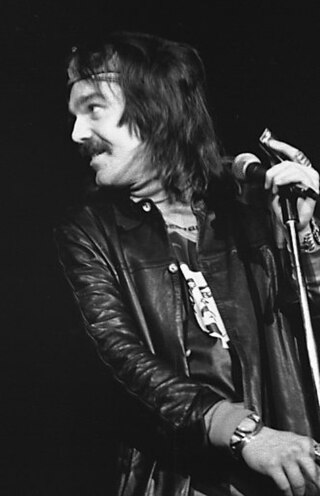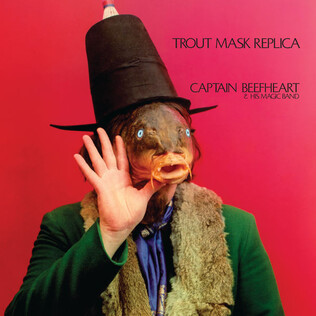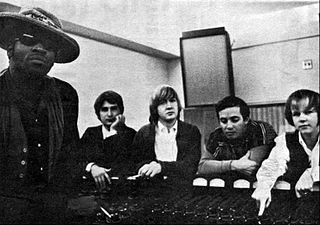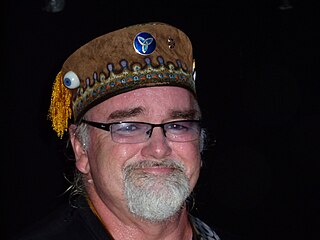
Don Van Vliet was an American singer, songwriter, multi-instrumentalist, and visual artist best known by the stage name Captain Beefheart. Conducting a rotating ensemble known as the Magic Band, he recorded 13 studio albums between 1967 and 1982. His music blended elements of blues, free jazz, rock, and avant-garde composition with idiosyncratic rhythms, absurdist wordplay, a gravelly voice, and a wide vocal range. Known for his enigmatic persona, Beefheart frequently constructed myths about his life and was known to exercise an almost dictatorial control over his supporting musicians. Although he achieved little commercial success, he sustained a cult following as an influence on an array of experimental rock and punk-era artists.

Trout Mask Replica is the third studio album by the American band Captain Beefheart and his Magic Band, released as a double album on June 16, 1969, by Straight Records. The music was composed by Captain Beefheart and arranged by drummer John "Drumbo" French. Combining elements of R&B, garage rock, and blues with free jazz and avant-garde composition, the album is regarded as an important work of experimental rock. Its unconventional musical style, which includes polyrhythm, multi-octave vocals, and polytonality, has given the album a reputation as one of the most challenging recordings in the 20th century musical canon.

John Stephen French is an American drummer and former member of Captain Beefheart's Magic Band, where he was known by the nickname Drumbo. He was the principal drummer on several of Beefheart's albums, including 1969's Trout Mask Replica, for which he also acted as arranger. He later released several albums as a solo artist as well as with the collaborative group French Frith Kaiser Thompson.

Rising Sons was an American folk-rock band formed in Los Angeles in 1965. Their initial career was short-lived, but the group found retrospective fame for launching the careers of singer Taj Mahal and guitarist Ry Cooder.

Lick My Decals Off, Baby is the fourth studio album by American musician Captain Beefheart and the Magic Band, released in December 1970 by Straight and Reprise Records. The follow-up to Trout Mask Replica (1969), it is regarded by some critics and listeners as superior, and was Van Vliet's own favorite of his albums. In his words, the title credo of the album was an encouragement to "get rid of the labels", and to evaluate things according to their merits.

The Spotlight Kid is the sixth studio album by Captain Beefheart. Released in 1972, it is the only album credited solely to Captain Beefheart rather than Captain Beefheart and his Magic Band, although every member is featured, and its material is considered part of the band's repertoire. Often cited as one of the most accessible of Beefheart's albums, it is solidly founded in the blues but also uses instruments such as marimba and jingle bells that are not typical of that genre. The incarnation of the Magic Band on this album was Bill Harkleroad and Elliot Ingber, guitars; Mark Boston, bass; John French, drums; and Art Tripp, marimba. Session drummer Rhys Clark substituted for French on one track, "Glider".

Strictly Personal is the second album by Captain Beefheart and his Magic Band. It was originally released in October 1968 as the first album on the Blue Thumb Records label. It was released nearly a year after the band had taken to the studio to record the follow-up to 1967's Safe as Milk, and was composed primarily of material intended for an aborted double-LP entitled It Comes to You in a Plain Brown Wrapper.

Safe as Milk is the debut studio album by American music group Captain Beefheart and his Magic Band, released in June 1967 by Buddah Records. A heavily blues-influenced work, the album features a 20-year-old Ry Cooder, who played guitar and wrote some of the arrangements.

The Magic Band was the backing band of American singer, songwriter and multi-instrumentalist Captain Beefheart between 1967 and 1982. Originally Beefheart had simply been the lead singer of the group, formed by guitarist Alex St. Clair, but eventually they morphed into a backing band for him. The rotating lineup featured dozens of performers, many of whom became known by nicknames given to them by Beefheart. Long-time members during the band's heyday included drummer/arranger John French, guitarist Bill Harkleroad, bassist/guitarist Mark Boston, percussionist/keyboardist Art Tripp, and guitarist Elliot Ingber. Ex-members of the Magic Band formed the short-lived group Mallard in 1974. The Magic Band reformed in 2003, without Beefheart.

Rockette Morton is an American musician, best known as a bassist and guitarist for Captain Beefheart and the Magic Band in the 1960s and 1970s.

Bill Harkleroad, known professionally as Zoot Horn Rollo, is an American guitarist. He is best known for his work with Captain Beefheart and The Magic Band. In 2003, he was ranked No. 62 in a Rolling Stone magazine list of "the 100 greatest guitarists of all time".

Christopher Walenty Dreja is an English musician, best known as the rhythm guitarist and bassist for rock band the Yardbirds for which he was inducted into the Rock and Roll Hall of Fame in 1992.

Bat Chain Puller is the 13th studio album by Captain Beefheart, released on February 22, 2012. It was recorded in 1976 by DiscReet Records, who had intended to release it with Virgin Records as Captain Beefheart's tenth studio album. It was co-produced by Beefheart and Kerry McNab.
"Moonlight on Vermont" is a song by Captain Beefheart. It was released on his 1969 album Trout Mask Replica.
Merrell Wayne Fankhauser is an American singer, songwriter and guitarist, who was most active in the 1960s and 1970s with bands including the Impacts, Merrell & the Exiles, HMS Bounty, Fankhauser-Cassidy Band, and Mu. In addition, 12 songs recorded by Merrell & the Exiles were later released under the group name Fapardokly, even though that group never actually existed.
Gary "Magic" Marker was an American bass guitarist and recording engineer, best known for his involvement in various psychedelic rock bands of the 1960s.
Moris Tepper, sometimes credited as Jeff Moris Tepper, is an American singer-songwriter, guitarist and artist.

Grow Fins: Rarities 1965–1982 is a 5-HDCD box set compiled from previously unreleased recordings by Captain Beefheart & the Magic Band. The featured material spans the band's entire career, but focuses mainly on their work up to the late 1960s and the sessions for Beefheart's best-known album, Trout Mask Replica (1969).

I'm Going to Do What I Wanna Do is a live album from Captain Beefheart and the Magic Band. In support of the US release of his album Shiny Beast , Beefheart and the band undertook a promotional club tour. On Saturday 18 November 1978 they performed at My Father's Place in Roslyn, New York. My Father's Place was located under a motorway bridge, held about 200 people and the patrons sat at long tables and could dine whilst listening if they wished. The show was recorded and mixed directly to two-track tape. The tape was used for a radio broadcast on WLIR-FM on 11 December 1978. Rhino Records made the album available for download, after a limited release on CD. Released by Rhino on 4/22/23 on 2 vinyl LP's, limited to 5000, for Record Store Day.

"Electricity" is a song by Captain Beefheart and his Magic Band on the 1967 album Safe as Milk. Beefheart claimed the label he and his band were signed to, A&M Records, dropped them after co-owner Jerry Moss heard the song and declared it "too negative" for his teenage daughter to listen to. Beefheart's vocals, while recording the final version for the album, shattered the microphone.















